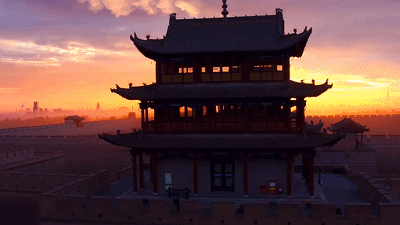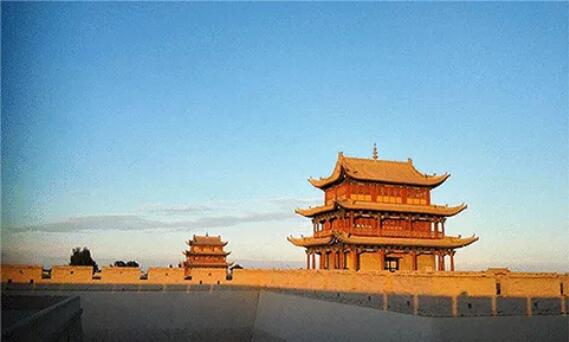

"Jiayuguan Pass" means a "Beautiful Valley" as it adjoins Qilian Mountain in the south, Mazong Mountain in the north, Jiuquan Basin in the east and flat Gobi in the west. It is just situated in the narrowest place of the western corridor in a reasonable layout. With both eastern and western gates within the Pass City, there are cities for gates protection covering an area of more than 500 square meters respectively. Both the city gates are open to the south, while in the west of the western enclosure, there built an outer city, and in the middle of the wall of the outer city, a pass gate is set in the west. On the lintel, three Chinese words of Jiayuguan are inscribed. Within the Pass City, the existing buildings mainly include Guerrilla General Office, Official Well, Guanyu Temple, Stage and Wenchang Pavilion.
Jiayuguan Pass scenic area is composed of three parts: Jiayuguan Pass, the First Beacon Tower, and the Overhanging Great Wall.
Jiayuguan Pass is located 6 km southwest of Juayugaung city. It got its name from the location at the foot of Jiayu Valley.
It was initially built in 1373 during Ming dynasty and enjoys a history of over 600 years. Jiayuguan Pass is the western end of Ming Great Wall as well as the most magnificent and best-preserved pass among over 1000 passes along the Great Wall of Ming dynasty. It is sandwiched between the two high mountains, which achieved its reputation as“the Impregnable Pass under Heaven” and it took 168 years to build this strategic outpost.
Jiayuguan Pass was built at the narrowest point of Hexi Corridor. It is not only of great strategic importance but also a must pass to the west along the ancient Silk Road.
Jiayuguan is a multi-tier defensive works, made up of Neicheng-the inner city, Wengcheng-the barbican entrance to the wall, Luocheng-the outer round defensive wall, Waicheng- the outer city and the moat. Its western outer defensive wall extends southward to the bank of Taolai River at the foot of Qilian Mountain and its northern end links with a hidden wall going halfway up to Heishan Mountain. Thus a complete military defensive system was formed and seemingly if one man guards the pass, no one can pass.